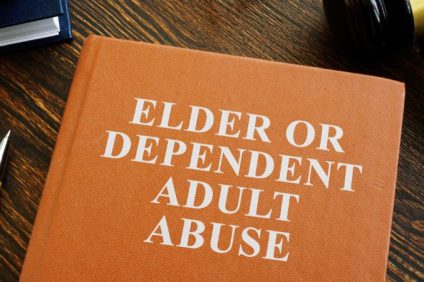California Elder Abuse Laws – All You Need to Know
When your loved ones begin to age, you are presented with a lot of important and difficult decisions. Caring for an elderly loved one is complicated and often puts family members in a difficult situation. Many people ultimately decide that nursing homes, residential care, or in-house nursing services are the best way to meet their loved one’s needs.
Many of these options are legitimate and truly help your aging loved one to live happily and comfortably. Unfortunately, this isn’t always the case. Whenever a vulnerable person, such as an elderly individual, is under the care of someone else, they are susceptible to elder abuse. This kind of activity is cruel, illegal, and eligible for legal punishment.

Whether you have an elderly loved one or are anticipating that stage of their life, it is important to know how to identify and stop elder abuse. The more you know how to spot this kind of treatment, the more empowered you will be to stop it.
One of the more accepted and practiced morals is to respect one’s elders. They bring life experience and wisdom to conversations, and they often have the best stories. They provide us with a link to our past, and they help us look to the future. However, respect is not always given to this highly vulnerable group.
Some people can be mentally and physically abusive toward elders. This happens within families and in care facilities such as nursing homes. Unfortunately, the severity of these instances is perpetuated by the assumptions that this group is weaker and lacks the knowledge to get the help they deserve.
Whether you are elderly or have a family member who is, educating yourself on the dangers of elder abuse can empower you to bring accountability to abusers and recover any compensation that could result from their actions.
This issue and its associated laws are very complex. That is why having expert nursing home abuse attorneys such as those at Belgum, Fry & Van Allen evaluating your circumstance sooner rather than later will always be the best first step in seeking justice for your elderly or dependent loved one.
How a Nursing Home Abuse Lawyer Can Help Prove Elder Abuse
The nursing home abuse lawyers at Belgum, Fry & Van Allen encourage concerned caregivers to use a free case evaluation if they think their loved one is being abused or neglected. Through this evaluation, a dedicated attorney at Belgum, Fry & Van Allen will determine the viability of your case and provide a recommendation for how to move forward.
As experts in the field, Belgum, Fry & Van Allen have noticed frequently asked questions brought to their attention through the free evaluation exercise and the subsequent follow-up with concerned caregivers. These loving family members and friends are often asking to better understand the California legislation around elder abuse and what qualifies as elder abuse and/or neglect.
Elder Abuse in California
Elder abuse is defined as intentionally acting or not acting in a way that could cause harm to an adult over the age of 65. It can be difficult to recognize and can surface in many different ways. There are seven types of elder abuse:
- Physical abuse. Evidenced by an increased frequency of hospital visits, a caregiver’s deliberate prevention of allowing one-on-one time, or insisting on advanced notice of visitations, physical abuse is when there is a use of force to inflict pain or injury on an elderly person. Often, you will notice unexplained cuts, bruises, burns, or fractures accompanied by fear, anxiety, withdrawal, or other signs of trauma.
- Emotional or psychological abuse. When there are noticeable changes in emotions, a decline in communication, an increase in apologizing, or changes in sleeping and eating patterns, there could be emotional or psychological abuse occurring. Unlike physical abuse, these instances are more difficult to recognize since they occur via various verbal and nonverbal acts.
- Sexual abuse. Nonconsensual sexual encounters can be particularly difficult for the elderly. Often suffering from physical deficiencies that create an inability to fight back, sexual abuse can result in unexplained genital bleeding, tenderness to sexual genitalia or other parts of the body, the contraction of a sexually transmitted disease, or an increase in aggression or sexual behavior outside of their normal personality.
- Elder neglect and endangerment. This is one of the most common types of elder abuse and occurs when a person or institution deprives an elder of basic care, including food, water, medication, or other living necessities. Often this is recognized from unexplained weight loss, a disheveled appearance, untreated medical conditions, or unsafe living conditions.
- Financial exploitation. Fraud can happen to anyone, and that is true for seniors as well. If a person forges an elderly person’s signature, deceives them into signing documents, or inappropriately cashes their checks, they are committing a fraudulent act. Common signs of this occurrence include unexplained loss of money or valuables, changes in a will or estate documents, or new loans or mortgages.
- This is exactly what it sounds like. When an individual or institution that is charged with the care of an elderly individual abandons that charge, it is considered abandonment.
- Self-neglect. This is when an elderly individual willfully refuses to care for themselves by ignoring basics such as food, water, shelter, and other essentials. However, if the person is of sound mind and body and refuses care, this does not apply.
Proving Elder Abuse in California
Elder abuse is covered by California Penal Code 368 and is a criminal offense. However, whether the charge is a misdemeanor or a felony depends on the circumstances. To prosecute an individual as a felony, the following must be met:
- There was the knowledge that the victim was elderly or that they were a dependent adult.
- The abuse (physical or mental) was committed purposefully with the intent to cause pain.
- The abuser is a caretaker and allowed harm to come to the one in their care willfully.
- The abuser is a caretaker who created an environment that could lead to harm.
While misdemeanors also meet the same criteria, the charges would indicate the abuse would not cause serious harm or death.
Civilly, the California Elder Abuse Act protects the elderly and dependent adults. This is a safety net that allows a victim to civilly pursue their abuser with or without criminal charges. This could help in recovering expenses that are required for physical or mental treatment and ongoing care.
Types of Elder Abuse
Just as with other types of abuse, there are many different ways that elder abuse can occur. In fact, every occurrence of elder abuse is different, which can make it difficult to identify. However, there are some main categories of elder abuse that are important to know. These categories include:
- Physical abuse. This includes actions such as kicking, hitting, punching, etc.
- Sexual abuse. This includes rape, trafficking, etc.
- Emotional abuse. Manipulation, harassment, and gas lighting all fall under this category.
- Financial abuse. This type of abuse is often categorized as stealing money or coercing an elderly individual to alter their will.
These types of abuse can all occur in either a domestic or institutionalized setting. Anyone caring for an elderly individual, whether they are a family member or a medical professional, is in a position to inflict abuse if they so choose. It is important to never assume that your loved one is not being abused, but rather always be on the lookout for signs and symptoms.

Signs of Elder Abuse
It is important to be able to recognize elder abuse as it is occurring. Some common signs of elder abuse include:
- Bruising, scarring, or other bodily marks
- Poor hygiene
- Sudden onset of mental illness symptoms
- Weight loss
It can be difficult to spot elder abuse right away, especially with situations involving bedsore injuries. Always be on the lookout for the above symptoms. Work closely with your loved one’s care team to ensure that your loved one is receiving proper attention. Investigate any claims that your loved one makes about abuse or neglect situations.
Penalties for Elder Abuse
California law outlines punishments for those who abuse elders. The punishments often depend on the age of the elderly individual. The older the victim is, the more harsh the punishment will be. This is because advanced age brings vulnerability and a decreased ability to defend oneself.
For inflicting physical or mental pain of any kind, a perpetrator faces up to a year in county jail and a fine of up to $6,000.
If the abuse causes significant bodily injury, the perpetrator faces three years in state prison if the victim is under 70 and 5 years if the victim is over 70.
If the abuse causes the victim to die, the abuser faces five years in prison if the victim was under 70 and 8 years if the victim was over 70.
When an individual knows that an elderly individual is in a dangerous or unhealthy situation and does not take reasonable action to stop it, they are negligent. For this, they face a misdemeanor charge, up to $2,000 in fines, and up to 1 year in county jail, depending on the situation.
Even those who are not in a care taking position can be charged if they steal or embezzle money from an elderly individual. In many cases, these abusers face fines ranging from $1,000 to $2,000 and jail time.
FAQs About California Elder Abuse Law
What Are the Laws in California Regarding Elder Abuse?
In addition to being listed as a mandatory reporting offense, elder abuse is covered by California Penal Code 368 as well as the California Elder Abuse Act (CEAA). CPD 368 is designed to criminally prosecute offenders, while the CEAA helps create an easier path to file a civil suit against an abuser.
What is Elder Abuse?
Elder abuse, which includes neglect, is defined by California in the Elder Abuse and Dependent Adult Protection Act. One of the important distinctions this law makes right out of the gate is that this act is meant to serve elders, which are defined as individuals 65 years or older, and dependent adults between 18 – 65 years old whose physical or mental conditions require assisted care.
The law lists a multitude of ways in which an elder or dependent adult can be neglected or abused by any person or entity that is responsible for the care or custody of the elder or dependent adult.
What Are the Seven Types of Elder Abuse?
Generally speaking, there are eight categories of dependent adult and elder abuse:
- Physical abuse
- Sexual abuse
- Neglect
- Financial abuse
- Abandonment
- Isolation
- Abduction
- Psychological abuse
While all of these forms of elder abuse and neglect are tragic, the elder abuse lawyers at Belgum, Fry & Van Allen specialize in the types of elder and dependent adult abuse typically seen at nursing homes and assisted living facilities. These cases generally involve some type of physical harm to the victim.
With expertise in litigating elder and dependent adult abuse cases stemming from nursing homes and assisted living facilities, the attorneys at Belgum, Fry & Van Allen recommend keeping a written record of complaints in regard to any suspected abuse.
The nursing home abuse lawyers at Belgum, Fry & Van Allen recommend five different steps to report elder abuse, which involve creating a written record of complaints to administrators and directors of care facilities, ombudsmen, and the California Department of Public Health (CDPH). In some cases, it’s necessary to involve the police immediately as well.
Regardless of the severity or consistency of the abuse or neglect, when the issue gets brought to your attention, calling a nursing home abuse lawyer is the correct first step. Whether you’re filing complaints to your loved one’s nursing home or involving the police, having proper representation will prioritize your loved one’s well-being.
How Common is Elder Abuse?
California has alarming rates of elder and dependent adult abuse that have been exacerbated during the COVID-19 pandemic. A helpful frame of reference was published in LAist, a Los Angeles County publication, which calculated that the number of elder abuse cases in Los Angeles, Orange, Riverside, San Bernardino, and Ventura Counties from 2005 – 2015 totaled 63,156 total cases across the eight categories of elder abuse.
This ten-year sample size across five Southern California counties is a notable data set for demonstrating the severity of this problem, which again, only increased during the recent pandemic. To put it simply, elder abuse in California is common, but it can be difficult to see the warning signs.
What Are Three Signs That May Indicate Elder Abuse Is Taking Place at a Healthcare Facility?
There is a wide-ranging spectrum of elder abuse categories, all of which can lead to different signs that abuse and/or neglect may be happening. Some of the more common and obvious signs include:
- Bruises, bedsores, pressure ulcers, broken bones, or any type of obvious physical indication of bodily abuse or neglect.
- A sudden and dramatic drop in mood, energy, and alertness. This can be a sign of physiological abuse or neglect that is causing your loved one to slip into a state of depression.
- A sudden spike in negative emotions or behavior like anger, rage, or verbal profanities, especially toward family, friends, or spouses.
It can also be common for victims of elder or dependent adult abuse and neglect to suffer in silence, so the signs may not be as clear. Keeping transparent and consistent lines of communication with your loved ones in assisted living homes or skilled nursing facilities will give you a better perspective on any behavior shifts.
What is the Statute of Limitations for Elder Abuse?
The simple answer is that the statute of limitations, which is the time frame for which you can file a suit related to an elder or dependent adult abuse or neglect case stemming from a nursing home or skilled nursing facility, is two years. However, elder abuse cases, in particular, can be tricky.
The reason is that more forces are working against a plaintiff in elder abuse and neglect cases, which can include:
- The reported neglect or abuse did not happen on a one-time basis but was gradual, ongoing, and not obvious.
- When dealing with elders, cognitive ability may become an issue during the span of a case, which may compromise the way they remember a set of facts or evidence.
- Some elder abuse cases may also involve medical malpractice, which generally carries a 1-year statute of limitations.
Since elder abuse and neglect cases can present a unique set of challenges, the sooner you call a nursing home abuse attorney in Los Angeles the better. Ultimately, when it comes to proving elder abuse, having an expert on your side who can best present the unique facts of your case will be your best foot forward.
What Are the Four Major Factors of Elder Abuse?
As a susceptible group in a population, the elderly are often targeted for abuse because they may be seen as weaker, they may be in poor health, their mind may allow them to be confused easily, or they suffer from poor mental health. Each factor could allow abusers to see them as easy targets.
What Types of Facilities Can Elder Abuse Occur In?
Nursing homes are often the catch-all term for any kind of facility that provides residence to dependent adults or elders on a full-time or part-time basis. However, there are several different types of institutions that carry niche services, all of which can be held responsible for elder abuse and neglect.
- Nursing home
- Assisted living facility / Residential care facility for the elderly (RCFE)
- Convalescent home
- Hospice
- Skilled nursing facility
Keep in mind the law states that someone can be accused of abuse or neglect if they have a substantial caretaking or custodial relationship with the elder or dependent adult. This often applies to each of those institutions listed above.
How Can I Help Someone Who May Have Experienced Elder Abuse?
If you suspect that someone you know or love is experiencing elder abuse, you should call the police and get them medical attention. Your next best course of action is to get an attorney involved. Elder abuse attorneys like our team at Belgum, Fry & Van Allen can expertly identify and navigate situations of elder abuse. It is important to move quickly in these scenarios. If you believe that your loved one is being abused, remain nearby until you can move them to a safe location.
Are There Criminal Penalties for Elder Abuse?
Yes. The state of California is not lenient on those who abuse the elderly. The punishment will depend upon the severity and type of abuse, as well as the age and health condition of the victim. Punishments range from a fine to many years in prison, depending on the situation. Healthcare professionals and caregivers may also lose their licenses or ability to continue in their careers. Elder abuse offenses are wobblers, so they can be categorized as misdemeanors or felonies.
What Makes an Older Adult Vulnerable to Abuse?
Many people lose strength, ability, and dexterity as they age. Because of this, they are less able to fight against physical abuse. Many elderly individuals become confused or are perceived as being unreliable, so many people do not believe them when they report abuse situations. Many elderly individuals have significant financial resources, meaning that they are targets for financial abuse. Overall, elderly people are less able to fight for themselves, meaning that abusers may take advantage of them.
What Are the Warning Signs of Elder Abuse?
There are many signs of elder abuse, including bruises, depression, anxiety, poor hygiene, malnutrition, and declining overall health. If you have any suspicion that your loved one is being abused, contact the authorities. It is best to investigate and find no abuse than to leave a vulnerable elderly person in an abusive situation.
Who Can Bring a Case Under the Elder Law Abuse Statute?
Because elder abuse cases deal with senior citizens, it creates convoluted scenarios more often than other areas of the law because time is working against the plaintiff. For instance, the nursing home abuse lawyers at Belgum, Fry & Van Allen are often asked whether legal action can be pursued if the victim has passed away. This of course has a lot of layers to it in and of itself, including:
- If the elder has passed away amidst perceived neglect and abuse, is the family still able to pursue the case in court?
- If the elder is deceased, did they pass away as a result of the abuse or neglect?
- If the elder passed away, was it from something unrelated to the abuse or neglect?
This is where having a nursing home abuse attorney can be an invaluable resource because it could mean the difference between correctly and incorrectly pursuing the legal action related to your case. To the questions above, the attorneys at Belgum, Fry & Van Allen encourage family members of the deceased to elect a representative for their loved one, especially if the facts of the case clearly point to elder neglect or abuse.
Furthermore, the cause of death and its relation to any abuse or neglect may not be so clear. A condition worsening as a result of poor treatment can be difficult to prove. However, if you have a nursing home abuse attorney on your side early in the process to review the facts of your case, review written records of your complaints, and help you better understand the statute of limitations around this law, the better off you are.
Belgum, Frey & Van Allen: Your Elder Abuse Attorneys
If you or a loved one have been the victim of elder abuse, it is important to know how to protect yourself or your loved one. Retirement is considered the golden years, and living free from physical or mental abuse is a part of that. If you need help with your elder abuse concerns, contact Belgum, Fry, & Van Allen. Our team specializes in elder abuse and can help you get the answers you’re looking for.




